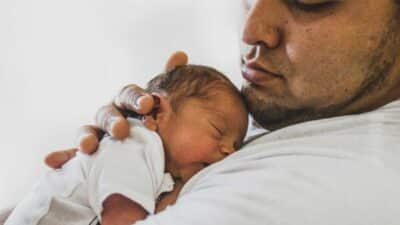Psychological aspects of infertility
But what is really true about the connection between fertility and psychological factors?
Psychological factors: When the desire to have a child weighs on the soul
When the desire for a child (and, in the first step, for a pregnancy) is disappointed cycle after cycle, women and couples are often advised not to get too attached to their child wish. “Relax, then it’s most likely to work out,” is typical advice. But what is really true about the connection between fertility and psychological factors?
Many couples are hit by an unfulfilled child wish quite unexpectedly. For years for example, they have paid strict attention to contraception, concentrated on finding the right partner, worked on their careers or simply waited for the right time. When the hoped-for pregnancy doesn’t happen even after a long time, couples often start to stumble. With each cycle and each new disappointment, the desire to have children and the longing for a pregnancy grow. Unwanted childlessness is often perceived by couples as a heavy psychological burden.
Often hurtful and unhelpful: the advice to just “relax”.
It’s a vicious circle that repeats itself every month: ovulation is calculated, everything is planned exactly, and yet the period still occurs. Many couples are then advised by those around them not to get bogged down in their desire to have children or to “just relax”. However, the people giving the advice are often unaware that these words and well-intentioned pieces of advice can trigger completely counterproductive feelings. After all, many couples have already gone through several months (in some cases years) without using contraception. Usually this begins without stress or thoughts that there might be difficulties with one’s life plan. But at a certain point, this ease tips over: couples start to worry, put pressure on themselves, and question their own biology or even the partnership.

Do couples with unwanted childlessness have a different psyche?
One often hears stories that as soon as couples distance themselves from their desire to have children, or a first pregnancy has already occurred and no further one is actively planned, it suddenly works out. Do couples’ psychological factors influence their fertility?
The question of whether there is a possible connection between psychological factors and fertility or infertility has been the subject of various scientific research for quit some time.
The Heidelberg psychologist, psychotherapist and psychoanalyst Dr. Tewes Wischmann, for example, investigates this topic in his work [1]. However, he describes the simple view that psychological factors and infertility are directly related as insufficient [2]. According to current scientific knowledge, couples with an unfulfilled child wish are, from a psychological point of view, initially largely unremarkable and psychologically similar to couples without fertility problems [3].
The Bonn professor of gynaecological psychosomatics, Dr. Anke Rohde, further emphasises that infertility patients with difficulties in conceiving are also not more neurotic per se than others, but represent nothing more than a “section of the normal population” — without any conspicuous features as far as their personality, partnership or attitude to sexuality is concerned [4].
The effects of stress on hormone balance
As it is so often the case, it is important to distinguish between causes and effects. If infertility patients suffer from stress and tension (and are perhaps more depressed than their peers), this is in the first instance not the cause but often the consequence of the unfulfilled child wish. The psychological stress surrounding the unfulfilled child wish can often become a life crisis for couples, says Tewes Wischmann about the results of the study “Heidelberger Kinderwunsch-Sprechstunde” [5].
According to Tewes Wischmann, it is scientifically proven that severe psychological stress can lead to significant hormonal imbalances in both women and men. This stress can come from very different sources, for example from the private environment, or from the pressure that “it finally has to work out with the child” and possibly a related partnership crisis. But other sources also play a role: a study from 2012 shows, that women who work more than 32 hours a week take significantly longer to conceive than women who work 16–32 hours a week [6]. And in men too, stress in work, social life and personal environment lead to lower sperm count, concentration, motility and even deteriorated morphology [7].

HIGH LEVELS OF STRESS HORMONES CAN REDUCE THE CHANCES OF CONCEPTION BY UP TO 30%.
Courtney Denning-Johnson Lynch from Ohio State University in Columbus proves in her study that a high stress factor can make conception more difficult or even prevent it. According to the results, a high concentration of stress hormones in the blood ensures up to 30% reduced chance of conception [8]. In evolutionary biology, this can be attributed to the fact that in earlier times it was potentially sensible not to conceive children during stressful and turbulent times.
Even though life situations (and associated stressors) are highly individual: The more you manage to reduce stress, the more your hormone balance will be favourable when you want to have children, which in turn makes pregnancy more likely to occur [9].
Furthermore, couples who want to have children should first and foremost moderate their expectations and pressure to perform. Do what is good for you! Go out, concentrate on the positive things in life. Do sports for balance and sleep together as often as you want — not only during the fertile days. Because frequent sexual intercourse promotes conception, as a study by the Indiana University of Bloomington proves. Women who have sex often influence their immune system, which helps the sperm to overcome the woman’s immune defences and fertilise an egg [10].
About Fertilly
At Fertilly, we have made it our mission to accompany couples (homosexual and heterosexual) and singles on the way to fulfilling their child wish. In doing so, it is important to us to create transparency in the area of fertility services, to provide information and knowledge on the topics of pregnancy and fertility and to help you to find the most suitable Fertility Center. Through cooperation with first-class Fertility Centres and clinics in Europe, enquiries about Fertilly are given preferential treatment. This means that our patients avoid the usually long waiting times and get appointments more quickly.
If you would like more information about Fertility Centers, success rates and prices, please contact us using this questionnaire. We will advise you free of charge and without any obligation.
-
Answer the first questions in the online form in order to book an appointment. This way we can better address your needs during the conversation.
-
We will find the best contact person for your individual needs. Schedule 20 minutes for the consultation.
-
We will introduce you to the right fertility clinic from our network, make an appointment and accompany you until your wish for a child is fulfilled.
Sources:
1. Stammer, H., Wischmann, T., Verres, R. (2004): Paarberatung und — therapie bei unerfülltem Kinderwunsch. Hogrefe, Göttingen.
2. Wischmann, T., Stammer, H. (2010): Der Traum vom eigenen Kind. Psychologische Hilfen bei unerfülltem Kinderwunsch. Kohlhammer, Stuttgart.
3. Kentenich, H., Wischmann, T., Stöbel-Richter, Y. (2013): Fertilitätsstörungen — Psychosomatisch orientierte Diagnostik und Therapie. Leitlinie und Quellentext — 1.Revision. Psychosozial Verlag, Göttingen.
4. Rohde (2001). Zur psychischen Situation ungewollt kinderloser Paare. In W. Fthenatkis & M. Textor (Hrsg.), Online-Familienhandbuch. München: Staatsinstitut für Frühpädagogik.
5. Wischmann T., (1998): Heidelberger Kinderwunsch-Sprechstunde. Eine Studie zu psychosozialen Aspekten ungewollter Kinderlosigkeit. Verlag Peter Lang, Frankfurt/Main.
6. Mutsaerts MA, Groen H, Huiting HG, Kuchenbecker WK, Sauer PJ, Land JA, Stolk RP, Hoek A. The influence of maternal and paternal factors on time to pregnancy–a dutch population-based birth-cohort study: the GECKO drenthe study. Hum Reprod. 2012;27:583–593. doi: 10.1093/humrep/der429.
7. Li Y, Lin H, Li Y, Cao J. Association between socio-psycho-behavioral factors and male semen quality: Systematic review and meta-analyses. Fertil Steril. 2011;95:116–123. doi: 10.1016/j.fertnstert.2010.06.031.
8. Lynch, C.D., Sundaram, R., Maisog, J.M., Sweenez, A.M., Buck Louis, G.M. (2014): Preconception stress increases the risk of infertility: Results from a couple-based prospective cohort study-the LIFE study. Human Reproduction, Vol.29, No.5 pp. 1067– 1075, 2014.
9. Institut für Demoskopie Allensbach (2007): Allensbacher Bericht 11/2007 Unfreiwillige Kinderlosigkeit Pook, M./Tuschen-Caffier B./Krause et al. (2000): Psychische Gesundheit und Partnerschaftsqualität idiopathischer infertiler Paare. In: Brähler, E./Felder, H./Strauß, B. (Hrsg.): Fruchtbarkeitsstörungen. Jahrbuch der Medizinischen Psychologie 17: 262–271.
10. Lorenz TK, Heiman JR, Demas GE. Interaction of menstrual cycle phase and sexual activity predicts mucosal and systemic humoral immunity in healthy women. Physiol Behav. 2015;152(Part A):92–98.










